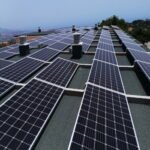
 Experience Excellence in Sustainable Heating Solutions: At Solares Energies, we specialise in transforming your living and working environments with our state-of-the-art Biomass Boilers and Wood Burning Stoves. As the leading supplier in Southern Spain, we pride ourselves on delivering products that embody efficiency, sustainability, and unparalleled quality.
Experience Excellence in Sustainable Heating Solutions: At Solares Energies, we specialise in transforming your living and working environments with our state-of-the-art Biomass Boilers and Wood Burning Stoves. As the leading supplier in Southern Spain, we pride ourselves on delivering products that embody efficiency, sustainability, and unparalleled quality.Our seasoned team, with its extensive knowledge and hands-on experience, ensures that every installation meets the highest standards of quality and efficiency. We are not just selling a product; we are offering a comprehensive heating solution tailored to your unique needs.
Innovative and Eco-Friendly Solutions
Dive into the world of eco-friendly heating with our advanced Biomass Boilers and elegantly designed Wood Burning Stoves. Our products are a testament to our commitment to reducing environmental impact while providing effective and reliable heating solutions.
![]() Customised for Your Comfort: Understanding that each space is unique, we offer personalised consultations to identify the most suitable heating solutions for your home or business. Whether you need the robust efficiency of our biomass boilers or the rustic charm of our wood-burning stoves, we have the perfect fit for your specific requirements.
Customised for Your Comfort: Understanding that each space is unique, we offer personalised consultations to identify the most suitable heating solutions for your home or business. Whether you need the robust efficiency of our biomass boilers or the rustic charm of our wood-burning stoves, we have the perfect fit for your specific requirements.
![]() Professional Installation: Our professional installation team is renowned for its precision and attention to detail. We ensure a seamless and hassle-free installation process, leaving you with a heating system that not only looks great but also performs flawlessly.
Professional Installation: Our professional installation team is renowned for its precision and attention to detail. We ensure a seamless and hassle-free installation process, leaving you with a heating system that not only looks great but also performs flawlessly.
![]() Dedicated Customer Service: At Solares Energies, your satisfaction is our priority. From the initial consultation to after-sales support, our dedicated team is always ready to assist you, ensuring a seamless experience at every step of your journey with us.
Dedicated Customer Service: At Solares Energies, your satisfaction is our priority. From the initial consultation to after-sales support, our dedicated team is always ready to assist you, ensuring a seamless experience at every step of your journey with us.
![]() Elevate Your Space with Solares Energies: Step into a world where warmth meets elegance, and efficiency meets sustainability. With Solares Energies, you’re choosing more than just a heating solution; you’re embracing a lifestyle of comfort and eco-conscious living. Our Biomass Boilers and Wood Burning Stoves are not just products; they are investments in a greener, more sustainable future.
Elevate Your Space with Solares Energies: Step into a world where warmth meets elegance, and efficiency meets sustainability. With Solares Energies, you’re choosing more than just a heating solution; you’re embracing a lifestyle of comfort and eco-conscious living. Our Biomass Boilers and Wood Burning Stoves are not just products; they are investments in a greener, more sustainable future.
Discover the perfect blend of luxury, efficiency, and environmental responsibility. For a professional consultation and to learn more about our range of products, contact Solares Energies – where excellence in eco-friendly heating solutions is just the beginning.
A biomass boiler, offered by Solares Energies, the #1 biomass boiler supplier and installer in Spain, is an innovative and eco-friendly heating solution. These boilers operate by burning sustainable and renewable fuels like wood, wood chips, pellets, or logs, effectively converting them into heat and energy. This renewable heating system aligns seamlessly with your current home setup, making the transition from traditional fossil fuel heating to a greener alternative both smooth and efficient.
Fuel Burning: Biomass boilers operate by burning natural fuels – typically wood pellets, logs, or wood chips.
Heat Generation: The combustion of these materials generates heat, which is then used to heat water in a system similar to conventional gas boilers.
Fuel Feeding: These boilers can be either manually fed or equipped with an automated system, depending on your preference and budget.
Maintenance: While requiring minimal upkeep, regular maintenance and ash removal are necessary to ensure optimal functioning.
Versatility: Biomass boilers can also provide hot water, much like traditional boilers.
One of the biggest selling points of a Biomass boiler is its ease of use. You are going back to basics burning a sustainable/renewable fuel to generate heat and energy. This renewable heating system works much like the existing boiler in your home, making the switch from traditional fossil fuel heating to a greener solution much easier. This renewable, sustainable, eco-friendly boiler utilises wood, wood chips, pellets, or logs, to generate heat.
Biomass boiler heaters work by burning the natural fuel that is intended for your specific system, whether that be wood pellets, logs, or wood chips, creating heat that can be utilised as a part of a heating system or for one localised area. For the boiler to continue operating it will need to be fed fuel, this can be automated or done manually depending on your preference and budget.
Your biomass heating system will require little maintenance to function, however, the ash that is built up from burning fuel will need to be removed occasionally, and regular biomass boiler servicing or maintenance wouldn’t be a bad idea.
Electric Boilers and Energy-Efficient Combi Boilers: For those seeking alternative energy-efficient heating solutions, Solares Energies also offers a range of electric and combi boilers, designed to meet diverse needs and preferences.
Solares Energies is committed to delivering professional, experienced service with every installation. Our professional team ensures that every biomass boiler system is installed with precision and care, guaranteeing not just a product, but a sustainable, long-term heating solution for your home.
A Wood Burning Stove, also known as a Wood Burner or Log Burner, is an efficient home heating appliance widely acknowledged for its capacity to effectively warm spaces using wood as fuel. Offered by Solares Energies, the leading supplier and installer in Spain, these stoves are designed with a blend of modern efficiency and traditional charm. Constructed primarily from robust materials like cast iron or steel, wood-burning stoves generate heat through the combustion of wood fuel in a contained fire chamber.
Effective Heating: Wood burners are celebrated for their significant heat output. Their ability to warm up rooms quickly and efficiently makes them a desirable choice for many homeowners.
Versatile Placement: These stoves can be installed in various rooms of a house, requiring a chimney or flue to safely vent fumes and gases.
Energy Efficiency: Compared to open fireplaces, wood burners are substantially more efficient. They convert a higher percentage of wood fuel into usable heat, reducing waste and fuel costs.
Aesthetic Appeal: Beyond their functional purpose, wood burners add an element of aesthetic charm to any room. They serve as a stylish focal point, enhancing the overall décor.
Ambience: The visual appeal of flickering flames and the cosy atmosphere created by a wood burner make it an ideal addition for creating a homely and inviting space.
Fuel Cost Savings: With the rising cost of conventional heating methods, wood burners present a cost-effective alternative. They can significantly reduce heating bills, especially if you have access to affordable or free wood fuel.
Reliability: In situations like power outages, wood burners remain operational, providing a dependable source of heat.
Eco-Friendly Heating: When sourced sustainably, wood is a carbon-neutral fuel. The CO2 released during combustion is roughly equivalent to that absorbed by the trees during growth, making wood burners an environmentally friendly heating option.
Solares Energies ensures that each wood-burning stove installation is tailored to meet the specific needs of your home. Their range includes various sizes and styles, suitable for different room dimensions and aesthetic preferences. With a focus on quality and sustainability, Solares Energies also guides on selecting the appropriate fuel type – whether it be logs, wood chips, or pellets – ensuring optimal efficiency and performance of your wood burner.
In summary, a wood-burning stove from Solares Energies offers a blend of efficient heating, environmental responsibility, and a touch of timeless elegance, making it a smart and stylish addition to any modern or traditional home setting.
![]() Written By:
Written By:
Wesley Lally
![]() Updated on:
Updated on:
23rd March 2024

 Other Pumps & Heater Systems
Other Pumps & Heater Systems Other Products & Services
Other Products & Services![]() Ground Source Heat Pump
Ground Source Heat Pump




 Biomass boilers have become increasingly popular in various sectors due to their eco-friendly nature and efficiency in providing renewable heating solutions. Key areas of significance for biomass boilers include agricultural and forestry regions, where the primary fuel sources – wood chips, pellets, and agricultural waste – are abundant. These boilers are particularly prominent in rural communities, where they serve as an ideal heating solution due to the ready availability of biomass materials and space for installation.
Biomass boilers have become increasingly popular in various sectors due to their eco-friendly nature and efficiency in providing renewable heating solutions. Key areas of significance for biomass boilers include agricultural and forestry regions, where the primary fuel sources – wood chips, pellets, and agricultural waste – are abundant. These boilers are particularly prominent in rural communities, where they serve as an ideal heating solution due to the ready availability of biomass materials and space for installation.
Technological innovation hubs and manufacturing plants are instrumental in the development and production of these boilers. They play a crucial role in advancing technology and making it more accessible and efficient for wider use. Educational institutes, especially those focusing on renewable energy, also form a critical part of the biomass boiler landscape, contributing through research and development of more sustainable and efficient biomass solutions.
Wood-burning stoves, embodying a blend of tradition and modern efficiency, are predominantly found in rural and mountainous areas where wood is a readily available resource. These stoves are not just functional appliances for heating but also add aesthetic value, particularly in historic towns and cottage industry regions known for their handcrafted wood-burning stoves.
In areas like forest communities, where the connection to nature is strong, wood-burning stoves are a practical choice, aligning with the lifestyle and environmental ethos of the residents. Moreover, wood-burning stoves hold a special place in off-the-grid communities and winter resort towns, where they provide essential heating in a self-sufficient manner. The charm and utility of wood-burning stoves in these areas are unmatched, offering warmth and comfort in the colder months.
![]() Eco-Friendly: Utilises renewable resources like wood pellets, reducing reliance on fossil fuels.
Eco-Friendly: Utilises renewable resources like wood pellets, reducing reliance on fossil fuels.![]() Carbon Neutral: The carbon released during combustion is offset by the carbon absorbed during the biomass growth cycle.
Carbon Neutral: The carbon released during combustion is offset by the carbon absorbed during the biomass growth cycle.![]() Energy Efficient: Modern designs ensure high efficiency, often better than traditional heating systems.
Energy Efficient: Modern designs ensure high efficiency, often better than traditional heating systems.![]() Cost-Effective: Reduces long-term energy costs, especially with stable biomass fuel prices.
Cost-Effective: Reduces long-term energy costs, especially with stable biomass fuel prices.![]() Government Incentives: Often eligible for grants or incentives to offset installation costs.
Government Incentives: Often eligible for grants or incentives to offset installation costs.![]() Local Economy Support: Creates demand for locally sourced biomass, supporting local businesses.
Local Economy Support: Creates demand for locally sourced biomass, supporting local businesses.
![]() Ambient and Aesthetic Appeal: Adds a cosy and traditional feel to the living space.
Ambient and Aesthetic Appeal: Adds a cosy and traditional feel to the living space.![]() High Efficiency: More efficient than open fireplaces, with improved heat output.
High Efficiency: More efficient than open fireplaces, with improved heat output.![]() Reduced Heating Bills: This can reduce reliance on central heating, leading to lower energy bills.
Reduced Heating Bills: This can reduce reliance on central heating, leading to lower energy bills.![]() Sustainable Heating: Uses renewable resources like wood, reducing carbon footprint.
Sustainable Heating: Uses renewable resources like wood, reducing carbon footprint.![]() Independence from Utilities: Less reliant on gas or electricity for heating.
Independence from Utilities: Less reliant on gas or electricity for heating.
![]() Higher Initial Costs: Installation and setup can be more expensive than conventional heating systems.
Higher Initial Costs: Installation and setup can be more expensive than conventional heating systems.![]() Space Requirements: Requires space for the boiler and additional storage for the biomass fuel.
Space Requirements: Requires space for the boiler and additional storage for the biomass fuel.![]() Regular Maintenance: Needs consistent maintenance, including fuel restocking and ash removal.
Regular Maintenance: Needs consistent maintenance, including fuel restocking and ash removal.![]() Fuel Availability: Dependence on the availability of biomass fuel in the local area.
Fuel Availability: Dependence on the availability of biomass fuel in the local area.![]() Complex Installation: This may require modifications to existing heating systems and properties.
Complex Installation: This may require modifications to existing heating systems and properties.
![]() Manual Operation: This requires manual fuel loading and ash cleaning, which can be labour-intensive.
Manual Operation: This requires manual fuel loading and ash cleaning, which can be labour-intensive.![]() Space Consumption: Takes up physical space within a room, and requires safe installation with adequate clearance.
Space Consumption: Takes up physical space within a room, and requires safe installation with adequate clearance.![]() Smoke and Particulates: Can emit smoke and particulates, requiring proper ventilation and flue systems.
Smoke and Particulates: Can emit smoke and particulates, requiring proper ventilation and flue systems.![]() Regulatory Compliance: Must meet specific installation and emission standards.
Regulatory Compliance: Must meet specific installation and emission standards.![]() Irregular Heating: Primarily heats the room it’s located in, which may not be efficient for larger properties.
Irregular Heating: Primarily heats the room it’s located in, which may not be efficient for larger properties.
 Solares Energies has a full range of renewable energy products available for the home or business. If you would like to learn more please navigate to our “Renewable Energy Products and Services Page” or complete the “GET A QUOTE” enquiry form at the top of this page and an experienced engineer will call you back, at a time best suited to you.
Solares Energies has a full range of renewable energy products available for the home or business. If you would like to learn more please navigate to our “Renewable Energy Products and Services Page” or complete the “GET A QUOTE” enquiry form at the top of this page and an experienced engineer will call you back, at a time best suited to you.




We supply, install and maintain solar panel systems and solar battery storage.
Improve energy efficiency and reduce your carbon footprint by installing an electric boiler.
We supply, install and maintain underfloor heating and cooling systems.
We supply, install and maintain uPVC windows and doors as well as double-glazing and composite doors.
User solar thermal as a renewable resource to heat up your household water supply.
Electric vehicle chargers supplied, installed and maintained by Solares Energies.
We supply, install and maintain heat pump systems. Reduce your carbon footprint.
Air conditioning systems supplied, installed and maintained by Solares Energies.
Sadly many companies throughout Spain are not qualified or experienced in, supplying and installing a Biomass Boiler System. Solares Energies has a wealth of knowledge and experience in supplying, installing and maintaining boiler systems. We have a dedicated team of electricians, gas fitters, plumbers and heating engineers based around the Costa del Sol area, covering the whole of Malaga, including Marbella, Estepona, Benalmadena and Manilva.
© 2024 SOLARES ENERGIES ALL RIGHTS RESERVED POWERED BY MINUS 5 MEDIA & DIGITAL MARKETING AGENCY.ES
